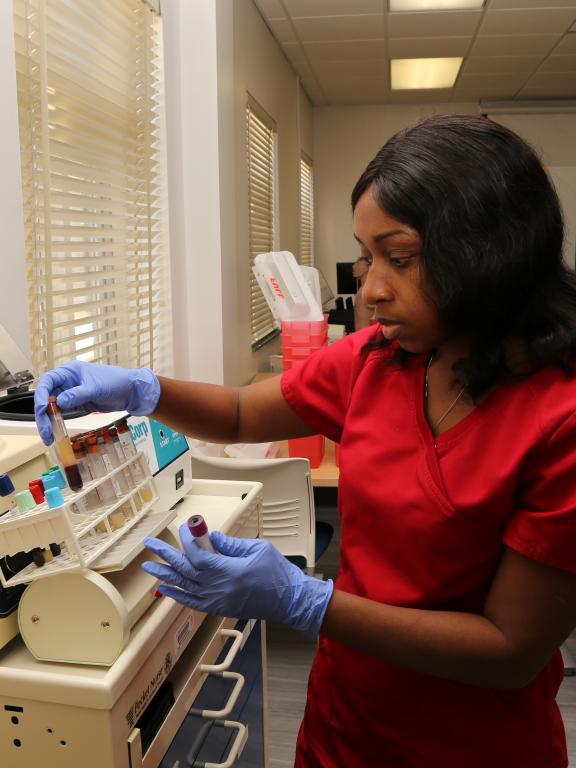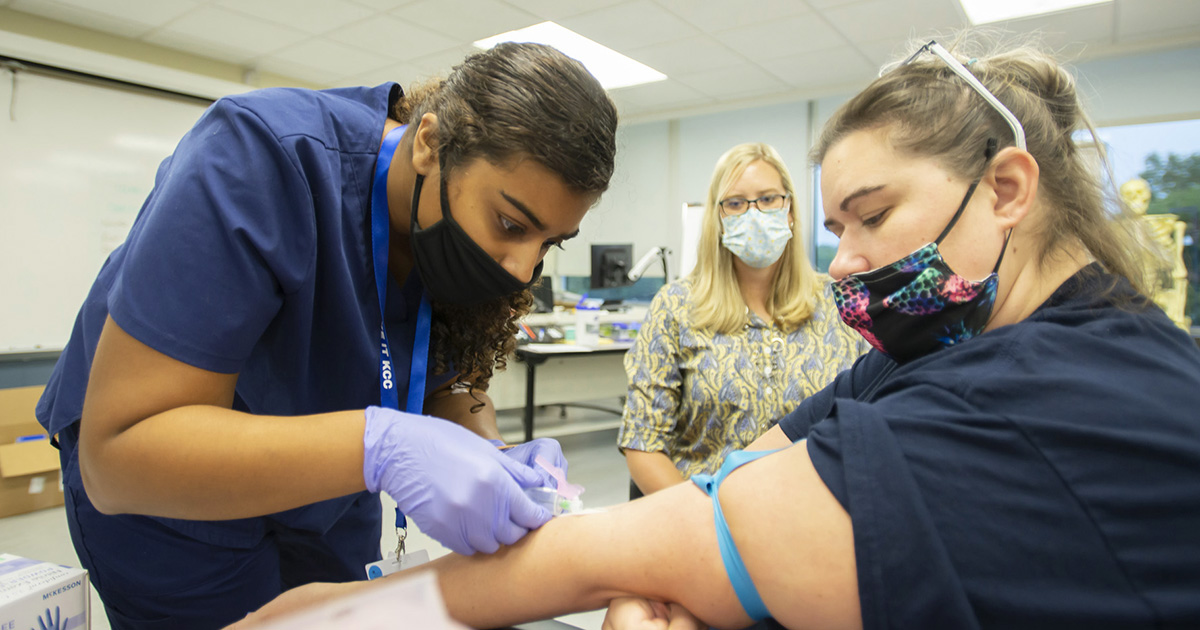Top Questions You Should Know Before Enrolling in a Phlebotomy Training Course
Top Questions You Should Know Before Enrolling in a Phlebotomy Training Course
Blog Article
The Course to Certification: Understanding the Phlebotomy Training Program Trip and Its Value
As you think about the path to certification in phlebotomy, it's vital to recognize the duty you'll play in medical care. Your training will cover vital skills, from blood collection techniques to patient communication.

The Function of Phlebotomists in Healthcare
Phlebotomists play an essential function in the healthcare system, working as the essential web link between patients and crucial analysis testing. You'll execute blood draws, ensuring samples are accumulated precisely and securely. Your experience assists in diagnosing clinical conditions, keeping track of wellness, and directing therapy decisions.
In your day-to-day interactions, you'll need to establish trust fund with clients, making them really feel comfy during what may be a difficult experience. You are in charge of labeling and managing examples very carefully to prevent contamination or errors, which might influence test results.
Past this, you'll often function together with doctors and registered nurses, interacting vital information concerning people' conditions. By understanding your abilities, you add meaningfully to individual care, making you a crucial part of the clinical team.
Overview of Phlebotomy Training Programs
When checking out phlebotomy training programs, you'll locate various kinds designed to fit various timetables and discovering styles. Each program assists you create essential skills like blood collection and person interaction. Understanding these options is key to picking the best course for your occupation.
Sorts Of Training Programs
A number of sorts of training programs are readily available for those aiming to come to be competent in phlebotomy. You can pick from certification programs, which typically last a few months and concentrate on necessary skills. There are additionally diploma programs that offer an even more comprehensive education, frequently lasting approximately a year. If you're seeking a deeper understanding, an associate level in a related field may be the right fit. On the internet programs provide adaptability for those stabilizing work or family members commitments, enabling you to study at your very own rate. Additionally, some health centers and centers offer on-the-job training programs, supplying sensible experience while you learn. Whatever course you choose, each program intends to outfit you with the essential skills for a successful phlebotomy career.

Key Skills Established
Grasping phlebotomy calls for a collection of key abilities that are established via thorough training programs. You'll find out technical skills like appropriate blood vessel choice, needle insertion, and blood collection techniques. These hands-on practices ensure you can perform procedures securely and effectively. Furthermore, interaction skills are fundamental; you'll require to engage with patients, explain procedures, and put them secure. Understanding anatomy and physiology is critical, too, as it assists you locate veins and understand the body's response to blood attracts. You'll get understanding of safety and security procedures and infection control, ensuring you preserve a clean and sterile environment. Each of these skills is crucial for your success as a licensed phlebotomist, making you an important possession in any healthcare setting.
Secret Elements of a Phlebotomy Program
In a phlebotomy training course, you'll concentrate on necessary topics that prepared for your future occupation. You'll participate in hands-on training that allows you to use what you have actually discovered in real-world setups. Both the curriculum and useful experience are crucial for your success as a phlebotomist.
Curriculum Summary
While seeking a phlebotomy training course, you'll come across a core curriculum made to furnish you with basic abilities and understanding. Phlebotomy Courses Near Me. This educational program normally consists of makeup and physiology, concentrating on the circulatory system and comprehending blood components. You'll likewise discover various sorts of blood collection approaches, consisting of venipuncture and capillary puncture techniques
Additionally, infection control and safety protocols are crucial components, guaranteeing you recognize just how to maintain a clean and sterile environment. You'll research patient interaction, emphasizing interaction and empathy, which are crucial for relieving person stress and anxiety. Ethical and legal considerations will certainly be resolved, preparing you for real-world responsibilities. This fundamental understanding will certainly allow you to excel as a phlebotomist and offer quality care in professional settings.
Hands-On Training Experience
Obtaining hands-on experience is a crucial part of your phlebotomy training course. This sensible training permits you to apply what you've learned in a real-world setting, boosting your skills and confidence. Phlebotomy Training Course.
Additionally, you'll get the chance to connect with people, which is important for creating your interaction abilities. This mix of technical proficiency and social abilities is vital for your success as a licensed phlebotomist. Eventually, hands-on training is where concept fulfills method, solidifying your understanding and preparedness for qualification.
Certification and Licensing Needs
Before you can begin your occupation in phlebotomy, it is vital to comprehend the accreditation and licensing demands that differ by state. Many states require i loved this phlebotomists to hold a certification from an identified company, such as the National Phlebotomy Association or the American Culture for Scientific Pathology. These accreditations usually entail passing an exam that examines your expertise and skills in the field.
In enhancement to accreditation, some states have particular licensing needs. You may require to finish a certain number of hours in clinical technique, submit proof of training, or undergo a history check. It is very important to investigate your state's guidelines to see to it you meet all necessary standards.
Staying notified about these demands not just aids you safeguard a position however additionally improves your reputation as a professional. By satisfying these demands, you'll be well on your way to an effective job in phlebotomy.
Hands-On Training and Practical Experience
Hands-on training and functional experience are essential components of your phlebotomy education, as they allow you to apply theoretical understanding in real-world situations. Throughout your training, you'll take part in supervised venipuncture, find out appropriate techniques, and become knowledgeable about various blood collection tools. This direct participation is critical for constructing your self-confidence and sharpening your abilities.
You'll function very closely with experienced specialists who can direct you via the nuances of individual communication and example handling. Each practice not only enhances your understanding however likewise prepares you for the fast-paced environment of health care setups.
In addition, several programs integrate scientific rotations, allowing you to experience varied settings, from health centers to outpatient facilities. This direct exposure helps you adapt to various challenges and client requirements, guaranteeing you're well-prepared for your future duty. Embrace these opportunities, as they're necessary to coming to be an experienced and caring phlebotomist.
Obstacles Encountered During Training
While gaining hands-on experience is vital, it is necessary to recognize the obstacles that can develop throughout your phlebotomy training. You could encounter anxiety when executing treatments on genuine people, specifically if you're new to the atmosphere. The stress to get everything right can be overwhelming. Additionally, grasping the abilities required for blood attracts takes practice; you might fight with strategy at first.
Time monitoring can likewise be a hurdle, as balancing concept, functional sessions, and personal dedications can really feel daunting. You might deal with varying learning speeds among your peers, bring about sensations of additional reading self-doubt if you believe you're falling behind. Adjusting to the different characters of trainers can be difficult, as each might have an unique mentor design.
Identifying these challenges beforehand can prepare you for success and assist you establish durability throughout your training trip.
Occupation Opportunities After Qualification

As you acquire experience, you may even think about focusing on locations like pediatric or senior citizen phlebotomy, catering to details patient requirements. Some phlebotomists choose to progress their jobs by becoming laboratory technicians or going after more education in healthcare areas.
Furthermore, your qualification can bring about roles in training or overseeing new phlebotomists, permitting you to share your expertise. With the medical care market continually growing, your abilities will always be in demand, leading the way for a secure and satisfying occupation. Embrace the opportunities waiting for you!
Frequently Asked Questions
What Is the Normal Duration of a Phlebotomy Training Course?
Phlebotomy training courses normally last around 4 to eight weeks. You'll participate in hands-on technique, class instruction, and online understanding. Completing this training prepares you for accreditation and a satisfying career in health care.
Are Online Phlebotomy Courses Available?
Yes, on the internet phlebotomy courses are readily available. They supply adaptability and comfort, allowing you to research at your own speed. Simply confirm the program is recognized to meet certification demands and gain valuable skills for your profession.
Just How Much Does Phlebotomy Training Usually Cost?
Phlebotomy training usually costs between $700 and $2,500, depending on the program and location. You must take into consideration factors like program size, consisted of products, and hands-on experience when selecting the ideal training for you.
What Prevail Prerequisites for Phlebotomy Training?
Usual requirements for phlebotomy training typically include a secondary school diploma or GED, booster shots, and a background check. Some programs may additionally require standard medical care understanding or qualifications, ensuring you're gotten ready for hands-on training.
Can I Work While Finishing My Phlebotomy Training?
Yes, you can function while finishing your phlebotomy training. Lots of students balance work with their studies, yet make sure to manage your time successfully to ensure you satisfy both job and training dedications successfully.
Report this page